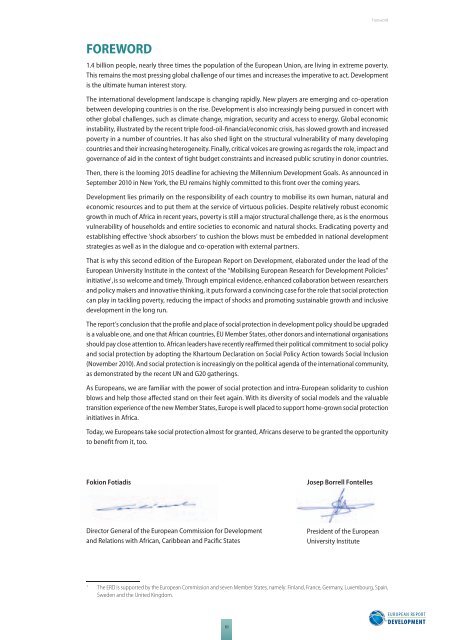social protection for inclusive development - European Report on ...
social protection for inclusive development - European Report on ...
social protection for inclusive development - European Report on ...
You also want an ePaper? Increase the reach of your titles
YUMPU automatically turns print PDFs into web optimized ePapers that Google loves.
The 2010 <str<strong>on</strong>g>European</str<strong>on</strong>g> <str<strong>on</strong>g>Report</str<strong>on</strong>g> <strong>on</strong> Development<br />
Foreword<br />
FOREWORD<br />
1.4 billi<strong>on</strong> people, nearly three times the populati<strong>on</strong> of the <str<strong>on</strong>g>European</str<strong>on</strong>g> Uni<strong>on</strong>, are living in extreme poverty.<br />
This remains the most pressing global challenge of our times and increases the imperative to act. Development<br />
is the ultimate human interest story.<br />
The internati<strong>on</strong>al <str<strong>on</strong>g>development</str<strong>on</strong>g> landscape is changing rapidly. New players are emerging and co-operati<strong>on</strong><br />
between developing countries is <strong>on</strong> the rise. Development is also increasingly being pursued in c<strong>on</strong>cert with<br />
other global challenges, such as climate change, migrati<strong>on</strong>, security and access to energy. Global ec<strong>on</strong>omic<br />
instability, illustrated by the recent triple food-oil-financial/ec<strong>on</strong>omic crisis, has slowed growth and increased<br />
poverty in a number of countries. It has also shed light <strong>on</strong> the structural vulnerability of many developing<br />
countries and their increasing heterogeneity. Finally, critical voices are growing as regards the role, impact and<br />
governance of aid in the c<strong>on</strong>text of tight budget c<strong>on</strong>straints and increased public scrutiny in d<strong>on</strong>or countries.<br />
Then, there is the looming 2015 deadline <str<strong>on</strong>g>for</str<strong>on</strong>g> achieving the Millennium Development Goals. As announced in<br />
September 2010 in New York, the EU remains highly committed to this fr<strong>on</strong>t over the coming years.<br />
Development lies primarily <strong>on</strong> the resp<strong>on</strong>sibility of each country to mobilise its own human, natural and<br />
ec<strong>on</strong>omic resources and to put them at the service of virtuous policies. Despite relatively robust ec<strong>on</strong>omic<br />
growth in much of Africa in recent years, poverty is still a major structural challenge there, as is the enormous<br />
vulnerability of households and entire societies to ec<strong>on</strong>omic and natural shocks. Eradicating poverty and<br />
establishing effective ‘shock absorbers’ to cushi<strong>on</strong> the blows must be embedded in nati<strong>on</strong>al <str<strong>on</strong>g>development</str<strong>on</strong>g><br />
strategies as well as in the dialogue and co-operati<strong>on</strong> with external partners.<br />
That is why this sec<strong>on</strong>d editi<strong>on</strong> of the <str<strong>on</strong>g>European</str<strong>on</strong>g> <str<strong>on</strong>g>Report</str<strong>on</strong>g> <strong>on</strong> Development, elaborated under the lead of the<br />
<str<strong>on</strong>g>European</str<strong>on</strong>g> University Institute in the c<strong>on</strong>text of the “Mobilising <str<strong>on</strong>g>European</str<strong>on</strong>g> Research <str<strong>on</strong>g>for</str<strong>on</strong>g> Development Policies”<br />
initiative 1 , is so welcome and timely. Through empirical evidence, enhanced collaborati<strong>on</strong> between researchers<br />
and policy makers and innovative thinking, it puts <str<strong>on</strong>g>for</str<strong>on</strong>g>ward a c<strong>on</strong>vincing case <str<strong>on</strong>g>for</str<strong>on</strong>g> the role that <str<strong>on</strong>g>social</str<strong>on</strong>g> <str<strong>on</strong>g>protecti<strong>on</strong></str<strong>on</strong>g><br />
can play in tackling poverty, reducing the impact of shocks and promoting sustainable growth and <str<strong>on</strong>g>inclusive</str<strong>on</strong>g><br />
<str<strong>on</strong>g>development</str<strong>on</strong>g> in the l<strong>on</strong>g run.<br />
The report’s c<strong>on</strong>clusi<strong>on</strong> that the profile and place of <str<strong>on</strong>g>social</str<strong>on</strong>g> <str<strong>on</strong>g>protecti<strong>on</strong></str<strong>on</strong>g> in <str<strong>on</strong>g>development</str<strong>on</strong>g> policy should be upgraded<br />
is a valuable <strong>on</strong>e, and <strong>on</strong>e that African countries, EU Member States, other d<strong>on</strong>ors and internati<strong>on</strong>al organisati<strong>on</strong>s<br />
should pay close attenti<strong>on</strong> to. African leaders have recently reaffirmed their political commitment to <str<strong>on</strong>g>social</str<strong>on</strong>g> policy<br />
and <str<strong>on</strong>g>social</str<strong>on</strong>g> <str<strong>on</strong>g>protecti<strong>on</strong></str<strong>on</strong>g> by adopting the Khartoum Declarati<strong>on</strong> <strong>on</strong> Social Policy Acti<strong>on</strong> towards Social Inclusi<strong>on</strong><br />
(November 2010). And <str<strong>on</strong>g>social</str<strong>on</strong>g> <str<strong>on</strong>g>protecti<strong>on</strong></str<strong>on</strong>g> is increasingly <strong>on</strong> the political agenda of the internati<strong>on</strong>al community,<br />
as dem<strong>on</strong>strated by the recent UN and G20 gatherings.<br />
As <str<strong>on</strong>g>European</str<strong>on</strong>g>s, we are familiar with the power of <str<strong>on</strong>g>social</str<strong>on</strong>g> <str<strong>on</strong>g>protecti<strong>on</strong></str<strong>on</strong>g> and intra-<str<strong>on</strong>g>European</str<strong>on</strong>g> solidarity to cushi<strong>on</strong><br />
blows and help those affected stand <strong>on</strong> their feet again. With its diversity of <str<strong>on</strong>g>social</str<strong>on</strong>g> models and the valuable<br />
transiti<strong>on</strong> experience of the new Member States, Europe is well placed to support home-grown <str<strong>on</strong>g>social</str<strong>on</strong>g> <str<strong>on</strong>g>protecti<strong>on</strong></str<strong>on</strong>g><br />
initiatives in Africa.<br />
Today, we <str<strong>on</strong>g>European</str<strong>on</strong>g>s take <str<strong>on</strong>g>social</str<strong>on</strong>g> <str<strong>on</strong>g>protecti<strong>on</strong></str<strong>on</strong>g> almost <str<strong>on</strong>g>for</str<strong>on</strong>g> granted, Africans deserve to be granted the opportunity<br />
to benefit from it, too.<br />
Foki<strong>on</strong> Fotiadis<br />
Josep Borrell F<strong>on</strong>telles<br />
Director General of the <str<strong>on</strong>g>European</str<strong>on</strong>g> Commissi<strong>on</strong> <str<strong>on</strong>g>for</str<strong>on</strong>g> Development<br />
and Relati<strong>on</strong>s with African, Caribbean and Pacific States<br />
President of the <str<strong>on</strong>g>European</str<strong>on</strong>g><br />
University Institute<br />
1<br />
The ERD is supported by the <str<strong>on</strong>g>European</str<strong>on</strong>g> Commissi<strong>on</strong> and seven Member States, namely: Finland, France, Germany, Luxembourg, Spain,<br />
Sweden and the United Kingdom.<br />
III
















